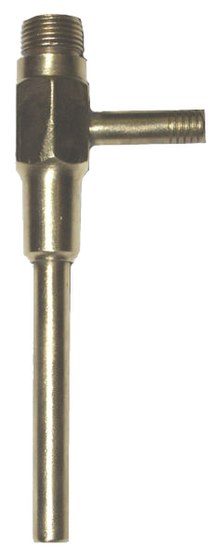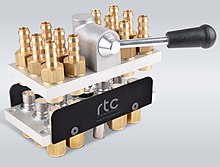Look up hose barb in Wiktionary, the free dictionary.
Hose barbs are cylindrical pieces or parts for attaching and securing of hoses (tubing). The barb-like rings on the cylindrical piece allow for an easy push-connection of flexible-plastic or rubber tubing that is not so easily disconnected. Hose barbs are used in machine perfusion and chemistry laboratory equipment. Hose barb fittings are small curved, bent or T-shaped pipes, hoses or tubes with hose barbs on at least one side used to join two or more pieces of piping (hosing, tubing) together.[1] Hose barbs are commonly used in the agriculture industry to connect anhydrous ammonia (NH3) hoses. [2]

 A copper aspirator. The water inlet and outlet are at the top and bottom, respectively; the air inlet is on the side. |

See also
editReferences
edit- ^ "An Introduction to Hose Barbed Fittings" (PDF). Brookhaven National Laboratory. Colder Products Company.
- ^ "NH3 (Anhydrous Ammonia) Hose Barbs". Continental NH3.
External links
edit